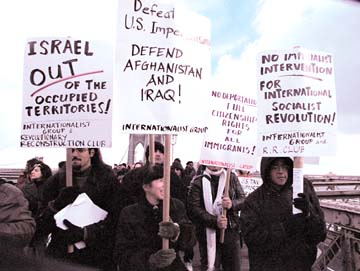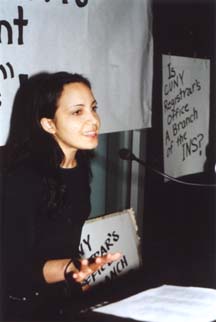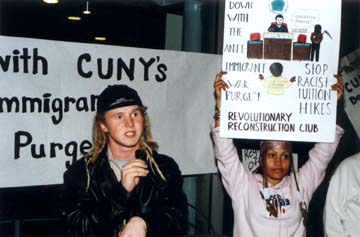
 |
Revolutionary
Reconstruction Group Joins IG
The Revolutionary Reconstruction Group, the core of young Marxist activists who lead the Revolutionary Reconstruction Club at Bronx Community College in New York, joined the Internationalist Group at a meeting of the two organizations on August 25. This follows the RRG’s presentation of the following statement to an IG meeting earlier this month:
“After a period of joint work between the Revolutionary Reconstruction Club and the Internationalist Group, during which time the ruling class, amidst an imperialist war in the U.S. and other countries, has engaged in increasingly repressive measures against workers and the oppressed, we of the RRG have seen for ourselves that the League for the Fourth International today continues the principled struggle for workers power. Our own desire to struggle for workers revolution, and the recognition that this requires the creation of vanguard parties around the world as part of the process of reforging the Fourth International, leads us to join forces with the IG, which today is carrying out this task. We therefore request membership in the Internationalist Group, U.S. section of the League for the Fourth International.”
 Joint
contingent of RRC and Internationalist Group crossing Brooklyn Bridge at
demonstration protesting Israel's attack on West Bank, 6 April 2002.
Joint
contingent of RRC and Internationalist Group crossing Brooklyn Bridge at
demonstration protesting Israel's attack on West Bank, 6 April 2002.
The origins of the Revolutionary Reconstruction Club go back to fall of 2000, when a young Puerto Rican Trotskyist began trying to establish a Marxist student group at Bronx Community College. Active in the fight to free Mumia Abu-Jamal and other issues, he was at that time a sympathizer of the Spartacist League. The core of the RRC also includes comrades won to Bolshevism from the New York Zapatista group and through polemicizing against religious obscurantism and nationalism on campus.
Efforts to build the club received an enthusiastic response from students at Bronx Community College (BCC), an overwhelmingly black, Hispanic and immigrant campus of the City University of New York (CUNY) that was singled out by the New York Times as a hotbed of opposition to the war on Afghanistan. CUNY officials try to run campuses like BCC like a small police state. (At nearby Hostos Community College, CUNY is waging a repressive vendetta against student leaders for leading protests against cuts in bilingual and Spanish-language programs.) Putting up one obstacle after another, BCC functionaries even tried to censor the club from describing itself as Marxist in its statement of purpose!
The Revolutionary Reconstruction Club was formally established in spring 2001. The name was chosen for two reasons. In the historic context of the U.S., it reflects the point that the full liberation of black people from social oppression cannot be solved under the lordship of capital. The “Radical Reconstruction” carried out in the U.S. South after the Civil War ended in the betrayal by the northern bourgeoisie of hopes for black equality. This task would require a revolutionary reconstruction of society, possible only in the form of another social revolution, one led by the working class, and aimed directly at the bedrock of black oppression, U.S. capitalism.
Simultaneously, in a broader sense, the term “revolutionary reconstruction” is borrowed from Marx and Engels, whose Communist Manifesto calls for the “revolutionary reconstitution of society” by means of a proletarian revolution.
The intention of those who formed the Revolutionary Reconstruction Club was to bring awareness of Marxist ideas and the many crucial struggles being waged across the world, while waging war against bourgeois liberalism, which saturates the outlook even of the so-called left in the United States. It sought to model itself after the Marxist study groups found in the early 1890s in Russia. The club was an idea born of the need to recruit fellow black, Latino and other poor students to the ranks of communist fighters, thinkers and militants. Until its inception the only recruiters at BCC were those of the U.S. military, who recruit cannon fodder on the basis of “economic conscription.” The only political group on campus was NYPIRG (New York Political Interest Research Group), a student lobbying group and Democratic Party satellite based among student government bureaucrats.
There is considerable potential for winning youth to revolutionary Marxism at CUNY, the largest urban university in the United States with approximately 200,000 students at over a dozen colleges. Enrolled at CUNY are students from more than 115 countries, and according to its own statistics its student body is 32 percent black, 31 percent white, 21 percent Hispanic and 12 percent Asian; a large majority of these students are working-class. Yet obeying the dictates of capital, after putting an end to the open admissions won by student and labor struggles in 1969 the CUNY administration has been escalating attacks on educational access for the sons and daughters of New York City’s proletariat.
Joint work with the Internationalist Group began at a November 2001 RRC meeting attended by a dozen people. An IG representative invited the club to join in building a united-front demonstration against the anti-immigrant war purge in which CUNY sought to force thousands of “undocumented immigrants” out of school, through a discriminatory and exorbitant tuition hike, as part of the U.S. imperialists’ “war on terrorism.” The demonstration proposal was greeted enthusiastically (despite the lame attempts of a Spartacist League spokesman to convince the club not to endorse the rally), and a period of intensive work began. In the course of this work RRG activists extended their activity to several different campuses and went head to head against student reformists and bureaucrats. In the effort to take a real step in class struggle against the U.S. war, an important part of the 28 November 2001 demonstration was the presence of immigrant workers from union and solidarity groups.


Revolutionary Reconstruction Club speaker
(left) at 28 November 2001 demonstration
against CUNY's “war purge” of immigrant students. The RRC at Bronx Community
College joined with Internationalist
Group in building the protest. (Photos: Sue Kellogg)
The joining together of the RRG with the Internationalist Group is an example of the kind of revolutionary regroupment made possible on the basis of a class fight against imperialist war. For RRG members, intensive joint work provided an important on-the-ground lesson on the Marxist stance on wars. The understanding that the “war purge” at CUNY was but a manifestation of the very real global war provided a powerful weapon against those who sought to confine the struggle to “student issues.”
Linking the defense of immigrants to the fight against imperialist war, the IG printed in pamphlet form Lenin’s classic Socialism and War. Over the course of the next months the IG’s position for the defeat of the U.S. imperialist attack and the defense of Afghanistan and Iraq proved to be the only one in accordance with the principles of the Bolshevik Party under the leadership of Lenin. The Spartacist League’s abandonment of the Leninist fight for the defeat of “one’s own” imperialist rulers in war dramatically brought home its step-by-step renunciation of key revolutionary principles. The comrades were particularly repelled by the SL’s attempt to smear the IG with pandering to “anti-Americanism” for upholding Lenin’s position.
Also important in the RRG activists’ evolution has been the ongoing and polarizing struggle against a wide range of opportunist positions pushed by reformists and campus bureaucrats who tail after the Democratic Party. RRG and IG comrades intervened together at a range of events to fight for “no discrimination” against the reformists’ promotion of “less” discrimination against immigrants via legislation to “allow” some and only some immigrants to go back to paying the prior tuition rate. We linked the fight for open admissions and free tuition to the broader program of class struggle and socialist revolution, and connected the fight to defeat specific attacks to the struggle to defeat the capitalist rulers’ war and their entire system of exploitation and racism.
Joint work continued with the publication of an IG/RRC leaflet for International Women’s Day and common contingents and sales teams at demonstrations in New York and Washington, D.C. in defense of the Palestinian people. The two organizations also had a joint presence in support of unionization drives among immigrant workers, at rallies by New York teachers and a strike by bus drivers in Queens. In this period comrades of the RRG saw the meaning of the IG’s commitment, in deeds and not merely words, to the tasks of bringing the Trotskyist program into the class struggle. An important part in this has been played by joint activity with worker cadres of the IG. Systematic Internationalist Group educationals, together with encouragement to present Marxist classes themselves, played a crucial part in the comrades’ development. This intensive course of study has included key works by Lenin and Trotsky, classes on revolutions of the 20th century, and a range of other subjects.
A central focus in these study classes has been the Marxist theory and analysis of the state, including the origin and history of bureaucratically deformed workers states such as Cuba and China, and the tasks of their defense in the period since the counterrevolutionary destruction of the Soviet Union. Bringing the RRG comrades closer to the IG/LFI, this underscored the crucial tasks that Trotskyists are called upon to lead, in particular the fight for proletarian political revolution against the Stalinist bureaucracy whose betrayals open the way for capitalist restoration. Such a political revolution in China would immediately pose the task of extending the revolution worldwide, with enormous appeal to the workers and oppressed throughout the region and elsewhere.
Joint work and study led RRG comrades to take the measure of the opportunism of those who have fought bitterly against the IG’s Marxist politics, strengthening and deepening the comrades’ political and programmatic understanding. In coming closer to the Internationalist Group – and especially because the comrade who founded the RRC had been a sympathizer of the SL for most of his political life while others were subscribers to the SL’s press – the comrades carefully investigated the differences between both groups and came to the conclusion that the SL’s series of “new” positions add up to a fundamental break with Bolshevism, which the IG continues to uphold.
The Trotskyist program reflects the accumulation of crucial lessons drawn from past proletarian struggles and paid in blood. Yet the current leadership of the SL and International Communist League makes a mockery both of the programmatic content and of more than a century of courageous struggles to implement this program in the “boiling water” of the class struggle, and the present fight to bring the Fourth Internationalist program into the struggles of the working class. RRG comrades came to compare the present ICL leadership’s attitude to the Marxist program with the outlook of “a spoiled rich kid who inherits a priceless asset and squanders it.”
Members of the Revolutionary Reconstruction Club repeatedly witnessed the inability of SL spokesmen to defend their organization’s abandonment of Leninism on a series of questions, among them the SL/ICL’s refusal to call for unconditional independence of the colonies, a question which Lenin and Trotsky rightly saw as a dividing line between communism and social democracy (and essential in the fight against all forms of nationalism), and its repudiation of the core of Trotsky’s Transitional Program, the understanding that the crisis of humanity is reduced to the crisis of revolutionary leadership. Instead of historically and theoretically-derived assessment, the SL/ICL is guided by temporary appearances, and shrouds its revisions in vague and evasive language. A crucial example is over the nature of fascist formations such as the National Front in France, just when it is most important to strive for the greatest clarity.
The comrades of the RRG join the Internationalist Group as full members, with the rights and responsibilities of Bolshevik militants. At the same time, they are youth whose ongoing training as professional revolutionaries will mean integrating the IG’s new opportunities for campus work into the overall fight to build a Leninist vanguard party. Needed is the kind of leadership training that can be acquired only in applying yesterday’s lessons to solve today’s problems on the burning terrain of the class struggle; the transformation of raw experience into conscious revolutionary lessons. That this can be achieved only in the fight to win new elements among the youth to the proletarian class struggle is a key lesson of another recent struggle in which LFI comrades fought for the Trotskyist program: the 10-month strike at the National University of Mexico (UNAM). The Revolutionary Reconstruction Club at Bronx Community College, together with the Internationalist Club at CUNY’s Hunter College, will continue to win students to Marxism and struggles such as the fight against militarism (such as the increasingly aggressive military and police recruiters) and imperialist war.
In The Revolution Betrayed, Trotsky wrote that “every revolutionary party finds its chief support in the youngest generation of the rising class” while noting that “healthy young lungs find it intolerable to breathe in the atmosphere of hypocrisy.” In joining the Internationalist Group, the comrades of the Revolutionary Reconstruction Group join in the task of winning the next generation of young workers and intellectuals to the cause of the world proletariat and its vanguard party, which in Lenin’s words much serve as “tribune of the people,” mobilizing the power of the proletariat for the emancipation of all the oppressed and exploited throughout the world through victorious socialist revolution.
– 25 August 2002
To contact the Internationalist Group and the League for the Fourth International, send e-mail to: internationalistgroup@msn.com